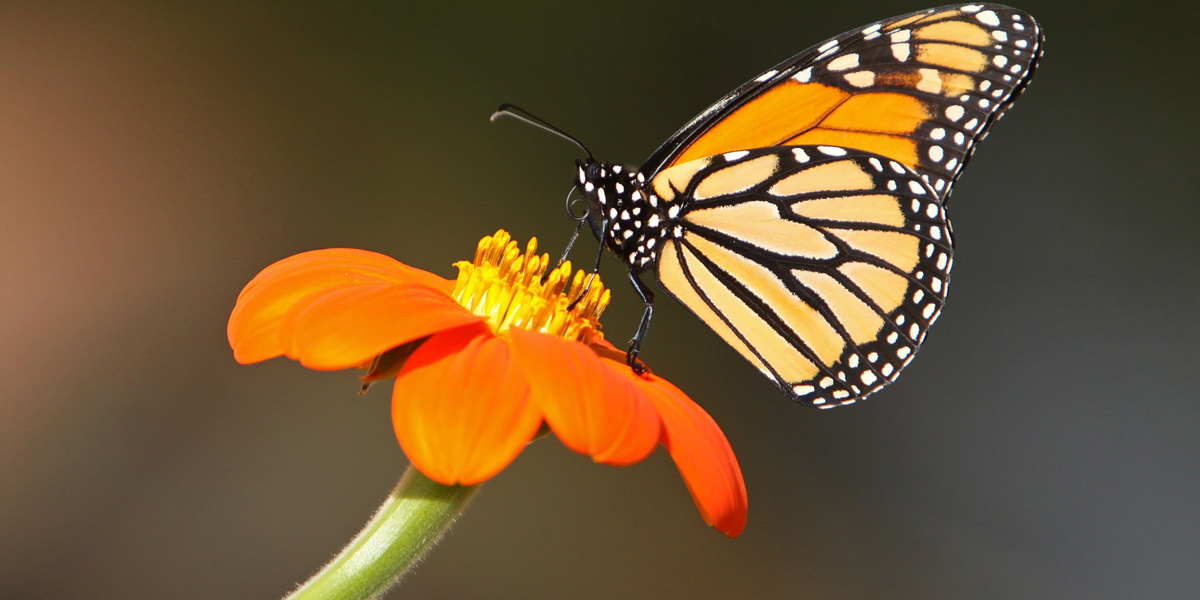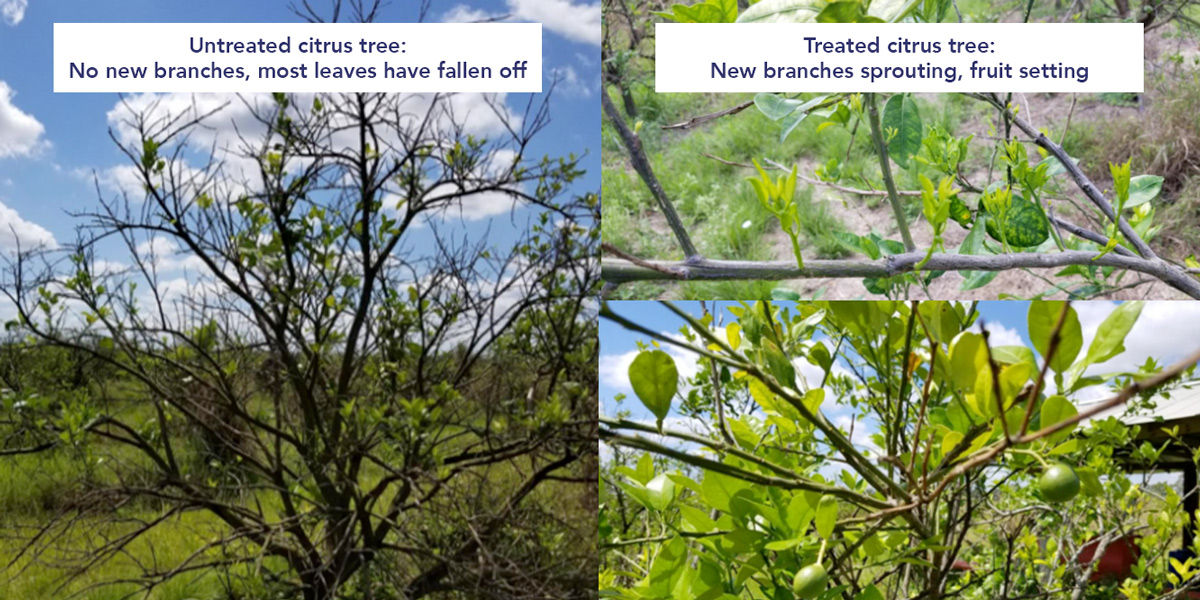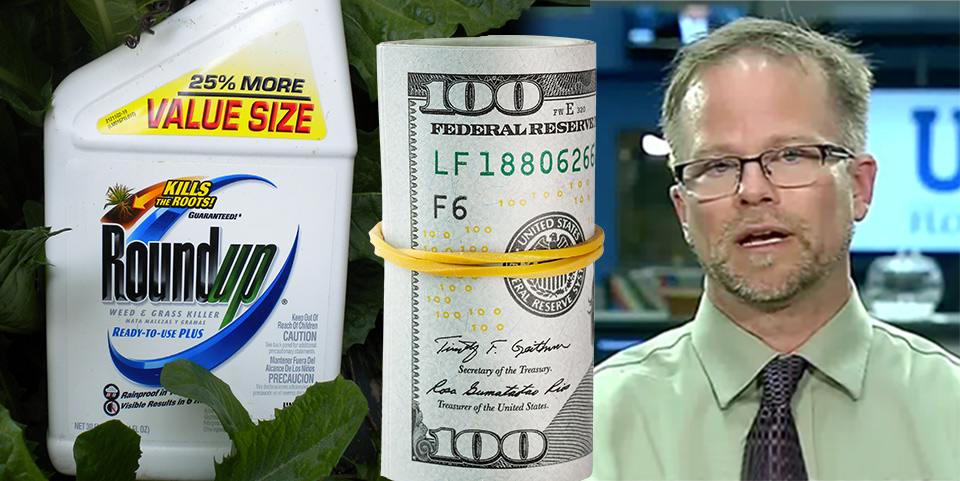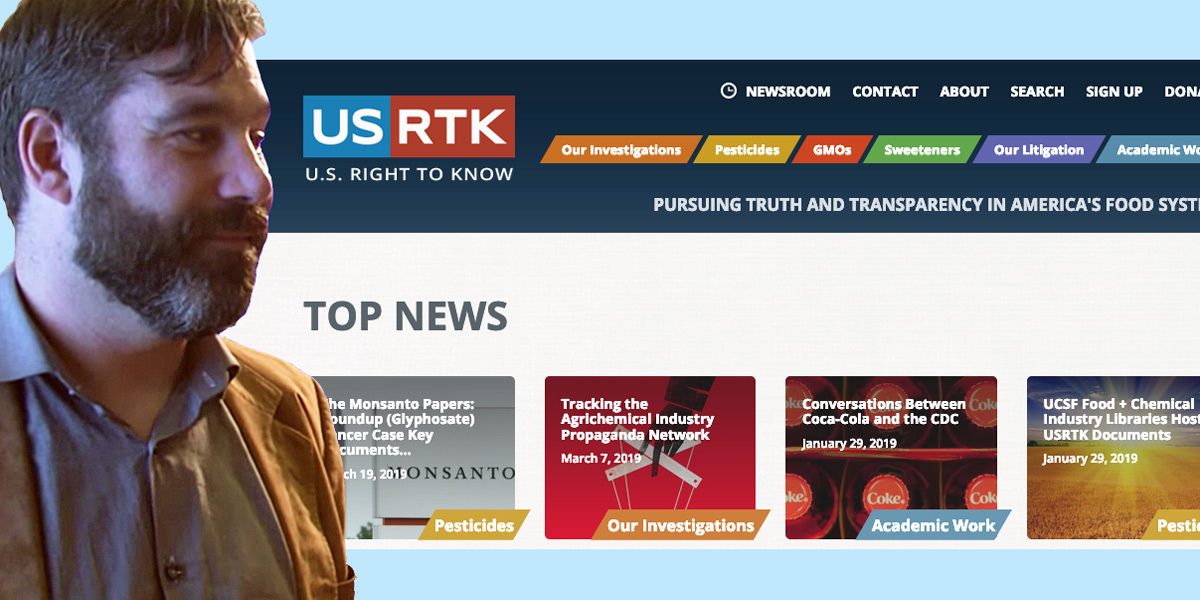US: Monsanto found liable for California man's cancer and ordered to pay $80m in damages
A federal jury has ruled that Monsanto was liable for a California man’s cancer and ordered the company to pay him $80m in damages. The ruling, which holds the company responsible for the cancer risks of its popular weedkiller, is the first of its kind in a US federal court and a major blow to Monsanto and its parent company, Bayer. The verdict comes just eight months after another jury issued a $289 million verdict (subsequently reduced by a judge to $78 million) over similar claims in a different case. A spokesperson said Bayer would appeal against the verdict, which could affect hundreds of other cases. Meanwhile US Right to Know has released a video interview with the victorious attorneys and the plaintiff Edwin Hardeman.
Bayer shares drop after US jury verdict in Roundup cancer trial
Shares in Bayer have hit an almost 7-year low after a US jury awarded $80 million to Edwin Hardeman, who blamed the company’s weedkiller Roundup for causing his cancer. Thousands of similar lawsuits are looming. A market analyst commented that the prospect of thousands of plaintiffs potentially being awarded tens of millions of dollars each means investors "start doing the numbers, and it doesn't look very pretty at all".
Bayer may face $5 bn in legal costs over glyphosate claims
Bayer investors didn’t realize how much litigation risk they were getting when the German company spent $63 billion in June 2018 to acquire Monsanto. Since then, two adverse verdicts concerning Roundup have rocked Bayer’s shares, which were down 38% as of March 20. With more than 11,000 Roundup cases still pending, along with a flood of lawsuits over waterways contaminated with PCBs and fresh cases emerging over another Monsanto herbicide, dicamba, investors are left to ponder the final cost of Bayer’s increased legal exposure.
US EPA wants to prevent states from restricting dicamba spraying
After months of denials and vague language, EPA has confirmed it is considering limiting the ability of states to restrict dicamba herbicide use beyond the federal label. Dicamba is sprayed on GM dicamba-tolerant soybeans but tends to drift off-target and kill other crops, as well as garden plants and trees.
Arkansas tried to restrict use of dicamba - but Monsanto fought back and won
Arkansas regulators have voted to relax restrictions on the weedkiller dicamba, despite testimony from scientists and scores of concerned citizens who urged them to reject the move. Dicamba drift from GM dicamba-tolerant soybean fields has damaged millions of dollars worth of crops, as well as wildflowers that honeybees rely on to produce honey.
Food crops likely next in line for dicamba damage
Andrew Joyce won’t be growing tomatoes this summer. His three-acre produce farm in Missouri will lie fallow. The cause: damage from the weedkiller dicamba, which is sprayed on GM dicamba-tolerant crops but drifts off-target. “I just like making things grow. I used to be pretty good at it,” Joyce said. “But now, with the chemical drift, you just don’t stand a chance to grow anything anymore.” Joyce said his produce was so heavily damaged by dicamba drift that he lost money and had to start driving a forklift to make ends meet.
Nebraska: Cost of investigating dicamba damage claims "strains resources"
Want to get an appreciation for what's like to be a state pesticide regulator in the age of dicamba? A presentation by Tim Creger, Nebraska Dept of Agriculture (NDA), at the annual meeting of the American Association of Pesticide Control Officials gives a taste. Creger states that in 2017, "NDA staff were quickly overwhelmed by volume of calls" and "Cost of investigating dicamba claims exhausted available funding by July 5". In 2018, he states, "Cost of investigating dicamba claims was still high, and continues to strain resources."
Indiana: Drift-prone dicamba herbicide complaints swamp state chemist
The Office of the Indiana State Chemist (OISC) became bogged down last year investigating a record number of complaints about the herbicide dicamba drifting off-target. So much so that the agency says "other equally or more important pesticide compliance issues… have been ignored or short-changed."
Palmer amaranth resistance to 2,4-D and dicamba confirmed in Kansas
Research has confirmed dicamba and 2,4-D resistance in a Palmer amaranth weed population collected from a long-term conservation tillage study in Kansas. This is the first confirmed case of resistance to dicamba and 2,4-D in Palmer amaranth, further magnifying the challenge to manage this weed for farmers using herbicide-tolerant GMO crops and herbicides instead of tillage to control weeds.
Last year it was dicamba, this year it’s 2,4-D
A volatile weedkiller linked to cancer and endocrine issues will likely be sprayed on millions more acres of soybeans and cotton across the Midwest and South starting this year. In January, China approved imports of a new GM soybean variety – Enlist E3 soybeans jointly made by Corteva Agriscience, a division of Dow Dupont and seed company MS Technologies – that can withstand the herbicide 2,4-D.
Early exposure to pesticides – including glyphosate – linked to increased risk of autism
Exposure to common agricultural pesticides, including glyphosate, before birth and in the first year of life is associated with a small to moderately increased risk of autism spectrum disorder (ASD) compared with infants of women without such exposure, finds a study published in the BMJ.
Exposure to glyphosate-based herbicides increases risk of non-Hodgkin lymphoma – new analysis
A new scientific meta-analysis of the cancer-causing potential of glyphosate herbicides found that individuals with high exposures to the herbicides have a 41% increased risk of developing non-Hodgkin lymphoma. The findings by five US scientists run counter to an assessment by the US EPA that found no cancer concerns.
Author of study linking glyphosate herbicide exposure to cancer answers criticisms
In an interview, Lianne Sheppard, an author of the meta-analysis finding a 41% higher risk of Non-Hodgkin's lymphoma in people exposed to high levels of glyphosate herbicides, responds to criticisms of her study by Monsanto and others.
New study shows cancer link to glyphosate herbicides
In addition to the study above, another epidemiological study has found a link between exposure to glyphosate herbicide and a type of non-Hodgkin lymphoma called diffuse large B-cell lymphoma.
Global Glyphosate Study pilot phase shows reproductive and developmental effects at "safe" dose
A new study has found that exposure to glyphosate-based herbicides (GBHs), including Roundup, caused reproductive and developmental effects in both male and female rats, at a dose level currently considered safe in the US (1.75 mg/kg bw/day).
EU: Four countries agree to take on task of assessing glyphosate
France, Hungary, the Netherlands, and Sweden have agreed to take over from Germany as the lead countries responsible for assessing the safety of glyphosate.
Study links Parkinson's disease and glyphosate herbicide exposure
New research conducted in Washington’s agricultural regions suggests glyphosate herbicides could be linked to more people dying from Parkinson’s disease before they turn 75. People living within 1 km of an area that had been sprayed with glyphosate were nearly one-third more likely to die from Parkinson’s disease before the age of 75.
Firm dumps glyphosate products as insurance company won't cover claims
Harrell’s, a firm that sells horticultural and golf course products, has decided to discontinue selling glyphosate products because its insurance company is no longer willing to provide coverage for claims related to glyphosate.
UK: Homebase dumps glyphosate
The DIY chain Homebase is removing weedkillers containing glyphosate from its shelves. The announcement came after a California court found that Roundup was a substantial factor in causing non-Hodgkin’s lymphoma in a man. Homebase had already taken action because it was the second ruling against the weedkiller in eight months.
Study fails to let GM crops off the hook for monarch butterfly decline
Many researchers blame GM glyphosate-tolerant crops for the catastrophic decline of the monarch butterfly, since glyphosate weedkillers applied to the crops eradicate milkweed, the monarch larvae's only food. But a new paper published in PNAS shifts much of the blame for the monarch's decline away from GM crops and onto other factors. The paper has been much hyped by GMO promoters. But experts have weighed in to point out serious weaknesses in the paper's methodology.
The herbicide glyphosate persists in wild, edible plants – study
Edible and medicinal forest plants that survive aerial spraying of glyphosate can retain the herbicide and related residues for at least a year, a new study has found. “The highest and most consistent levels of glyphosate and AMPA (aminomethylphosphonic acid) were found in herbaceous perennial root tissues, but shoot tissues and fruit were also shown to contain glyphosate in select species,” according the study.
What’s the world’s most widely used herbicide doing to tiny critters?
Glyphosate and glyphosate-based herbicides such as Roundup herbicide are increasingly scrutinized for human health impacts, but scientists say they also could be altering the wildlife and organisms at the base of the food chain. Evidence is growing that glyphosate and Roundup may impact the metabolism, growth and reproduction of aquatic creatures and could be altering the essential gut bacteria of animals such as bees.
British Columbia Assembly Member calls for glyphosate ban in forests
Mike Morris, Member of the Legislative Assembly for Prince George-Mackenzie in British Columbia, Canada, is working on a private members' bill to ban the use of glyphosate herbicide in the province's forests. "The concern I have is that it kills all the deciduous growth in a forest that is supposed to support more than just conifer trees," he said. "It kills the grasses and the blueberries and the roses and all the other things that animals live on and it affects the food supply right from your mice and your insects all the way up to ungulates, like your moose. That's where my concern is."
Vietnam bans import of glyphosate herbicides after US cancer trial verdict
Vietnam has announced that it has banned the import of all glyphosate-based herbicides with immediate effect following the latest cancer trial verdict from San Francisco, in a move which has shaken Bayer’s Asian market for its top-selling product.
Eating out: A date with glyphosate
Food testing commissioned by GMO Free USA found that glyphosate and its breakdown product or metabolite, AMPA, are pervasive in foods served by major restaurant and fast food chains in the US. Notably, the highest levels of glyphosate were detected in “whole grain” or “multigrain” foods, which consumers typically seek out and perceive as a healthier choice.
Glyphosate found in beer
Traces of glyphosate weedkiller have been detected in many household-name beers and wines, according to a report. Glyphosate was found in all but one of 20 brands – including organic ones – in a study conducted by public-interest advocacy group US PIRG.
Glyphosate found in 98 percent of Canadian honey samples
As US regulators continue to dance around the issue of testing foods for residues of glyphosate weedkillers, government scientists in Canada have found the pesticide in 197 of 200 samples of honey they examined.
New US bill aims to limit children’s exposure to glyphosate herbicides
Rep. Rosa DeLauro (D-Conn.) has introduced legislation to dramatically limit American children’s exposure to glyphosate in food. The bill would not only ban pre-harvest spraying of glyphosate on oats but also require the federal government to test foods popular with children for the herbicide.
ECJ annuls EFSA decisions refusing access to toxicity and carcinogenicity studies on glyphosate
In a landmark decision, the EU Court of Justice has ruled that the European Food Safety Authority (EFSA) was wrong to refuse access to toxicity studies related to glyphosate, a controversial pesticide. The confidential studies were at the heart of EFSA’s favourable assessment of glyphosate, which led to the pesticide’s approval in the EU in 2018, despite a warning by the World Health Organisation linking it to cancer. Greenpeace EU food policy director Franziska Achterberg said: “Today's judgement is a big step towards transparency and accountability in EU decision-making."
Expert says there’s a cure for citrus greening – so why is it being ignored?
As the US government and research institutes bank on antibiotic sprays and future GMOs to save dying citrus groves, Frank Dean, product development manager at Performance Nutrition®, says a simple solution is available, but few are listening. Dean suspects glyphosate might be a culprit in the disease – and his solution involves minimising the chemical's use.
Impacts of GM contamination in Canada
Since GM crops were introduced into Canadian agriculture almost 25 years ago, GM contamination has had significant economic consequences, according to a new report published today by the Canadian Biotechnology Action Network (CBAN) and the SaskOrganics’ Organic Agriculture Protection Fund (OAPF) Committee. CBAN and OAPF are calling on the federal government to help prevent future GM contamination by deregistering GM alfalfa and halting trials of GM wheat.
CRISPR spin-off causes unintended mutations in DNA
The past few years have seen a large number of research articles showing that the CRISPR gene-editing tool, designed to make a double-strand break in the DNA in a targeted location, may also cause many unintended mutations (damage to DNA). Genetic engineers have tried to get around this problem by adapting the CRISPR gene-editing tool so that it no longer makes a double-strand break in the DNA. One adaptation consists of piggybacking onto the CRISPR tool an enzyme that changes individual DNA bases (so called “base editing”). However, two new papers show that CRISPR base editing introduces more unwanted mutations than expected in mouse embryos and rice plants.
Gene-edited foods are GMOs, says China
China's GMO regulator MARA (the Ministry of Agriculture and Rural Affairs) has said that "gene edited products fall in the scope of the country's GMO regulations, and could be regulated as a GMO", according to a report by the US Dept of Agriculture. However, the USDA adds, "MARA indicated that new regulations are under development that may provide a simplified regulatory process for some gene edited products in the future." This suggests a weakened regulatory regime.
Japan set to de-regulate gene-edited foods
The Japanese government is set to de-regulate gene-edited foods, subjecting them instead to a voluntary system whereby the developer company submits information on them. But the Japanese public is reportedly unconvinced of the safety of gene-edited foods and a consumers' organisation opposes the government's stance.
US example shows why "new GM" crop plants must be regulated
The US Department of Agriculture (USDA) has already given non-regulated status to more than 20 plants genetically engineered with so-called genome editing techniques, according to research by Testbiotech. None of the applications registered at USDA were referred for further more detailed assessment. The Testbiotech report shows that there are, however, significant differences in methods of production, traits, and risks of the non-regulated plants, in comparison to those derived from conventional breeding.
Gene-edited soybean oil touted as Non-GMO
A new gene-edited soybean oil has gone on sale in the US. The oil, called Calyno, was developed by Calyxt. Calyxt stated that Calyno is not GMO as the soybeans have had no foreign genes introduced into their DNA. However technically, scientifically, and legally (in the EU), this soybean oil is GMO.
Gene-silencing GMO dsRNA insecticides can be taken up by soil microbes
New GMO gene-silencing insecticides don't degrade as efficiently as previously thought, a new study shows. They can persist in soil and be taken up by soil microbes, potentially reducing the expression of one or more crucial genes, impacting their viability and thus disrupting the soil microbiome.
Bt brinjal still failing in Bangladesh
The release of GM Bt brinjal (eggplant) in Bangladesh did not yield the expected results and farmers did not benefit, said Farida Akhter, executive director of the civil society organisation UBINIG. Akhter was speaking against the planned release of GM golden rice in the country, saying that as Bt brinjal had failed, there was no reason to introduce the GM rice. UBINIG conducted a field-level survey from December 2018 to January 2019 among 48 Bt brinjal farmers who cultivated the crop in 2014-15. Only 13 of the farmers continued its cultivation in 2015-16. Five of them continued it in 2016-17, and three in 2017. Farmers alleged that the crop did not yield as much as expected, while some crops also rotted in the field during cultivation.
Cotton yields have stagnated in India and pesticide use has increased
When GM seeds were being debated in the 1990s, Indian cotton accounted for nearly half of the pesticides sprayed in the country, despite being planted on only 5% of farmland. GM cottonseeds are now widely available (which should, in theory, reduce pesticide use), but national yields have largely stagnated and use of pesticide sprays has increased over the last decade.
In fresh blow to Monsanto, India cuts GM cotton seed royalty
India has cut the royalties that local seed companies pay to Bayer’s Monsanto unit for the third time in four years. The decision could prompt Monsanto and other foreign seed companies to further scale back investment in the sector. It comes at a time when India’s cotton output is falling.
Monsanto’s GMO drought-tolerant maize failed in US, now pushed on Africa
A recent US Department of Agriculture (USDA) report confirms what independent biosafety scientists and African civil society have been stating all along: Monsanto’s GMO drought-tolerant (DT) maize does not work. The USDA report reveals that performance of maize varieties transformed with the GM trait claimed to be DT is poor in terms of both yields and adoption rates, as compared with non-GM (conventionally bred) DT corn.
Agrochemical industry "almost out of options" to control herbicide-resistant weeds
The weed waterhemp is now capable of developing resistance to eight chemical modes of action. When asked if farmers could wait for a new active ingredient to come along, University of Illinois weed scientist Aaron Hager says there’s “nothing coming through the pipeline". Hager emphasizes that chemistry is not a long-term fix and "We’re really almost out of options."
Mystery of French babies born with deformed arms – are pesticides to blame?
The French national birth defect agency REMERA recently identified clusters of children born with malformed limbs in three rural regions in France. Each cluster has three to eight children with malformations that include children with missing or deformed arms and hands. REMERA has proposed that the limb malformations could result from exposure to pesticides and herbicides that are used on nearby farms. Herbicides such as glyphosate have been shown to cause limb malformations in frog embryos in laboratory experiments.
$340 billion in annual disease-related costs associated with endocrine disrupting chemicals
The costs of pesticide use extend far beyond the invoices farmers pay for purchase of the chemicals to use on their crops. A new book investigates the economic costs of pesticide-related diseases and other health problems to the US economy — and places the costs at around 2.3% of GDP (gross domestic product), or $340 billion, annually.
US FDA paves way for GMO salmon to hit market
The FDA has cleared the sale of GM salmon in the US for the first time since the fish was approved as the first GM animal for human consumption more than three years ago. The move appears to end a years-long political standoff over the fish driven by salmon-state lawmakers.
Critics warn GM salmon import approval puts consumers and fisheries at serious risk
The Trump administration has lifted a ban on importing GM salmon, in a move that consumer advocates charge "runs counter to sound science and market demand". The fish will not be adequately labelled as GM. The FDA's decision, made without consulting indigenous groups who rely on salmon for food and income, also roiled tribal leaders. "It's unconscionable and arrogant to think man can improve upon our Creator's perfection in wild salmon as a justification and excuse to satisfy corporate ambition and greed," declared Fawn Sharp, president of the Quinault Indian Nation.
Gene-edited animal creators look beyond US market
Tired of what they see as regulatory confusion and a lack of funding, some US researchers are taking their gene-edited livestock abroad, to countries such as Brazil. In 2017, the FDA released draft guidance that suggested it will regulate gene-edited animals as "animal drugs". The only animal that the FDA has approved via that pathway is a fast-growing GM salmon, in a decision that was decades in the making.
US ambassador says Britain should embrace American farming methods such as chlorinated chicken
The EU is a “museum of agriculture”, the US ambassador to Britain said, as he urged the UK to embrace American farming methods to seal a transatlantic trade deal. Woody Johnson says US practices such as chlorine-washing chicken and feeding growth hormones to cattle are “the future of farming” while the EU’s “traditionalist approach” belongs in the past.
British farmers fear US pressure on GMOs after Brexit
In the event of a no-deal Brexit, the UK government should not rush to strike a trade deal with countries like the US, an official from the UK National Farmers Union said. He said the UK will come under intense US pressure to open its doors to new GM foods after Brexit. “There is no doubt and the US government and the industry have made it clear that they would expect that,” he said.
I’ve been a farmworker all my life. Here’s why you should buy organic food
Consumers who choose organic food also help create a safer and healthier food system for everyone, from farm to table, writes Rudy Arredondo, founder and president of the National Latino Farmers & Ranchers Trade Association and a board member of the Rural Coalition.
How America’s food giants swallowed the family farms
Across the Midwest, the rise of factory farming is destroying rural communities. And the massive corporations behind this devastation are now eyeing a post-Brexit UK market. This shocking article gives a glimpse of the grim, intensive ag system that the UK will be supporting via its imports if the government makes a trade deal with the US.
The startup taking on Bayer with cheaper, non-GMO seeds
Farmers Business Network’s non-GMO corn seed ships directly to farmers for $115 a bag, compared with an average price of $270 a bag for GMO seeds. Trent Dabbs, whose family farms 3,000 acres in Arkansas, is planting the majority of this spring’s corn acreage with F2F Genetics Network seed. That will cut his seed bill by more than half and allow him to sell his grain at a premium because it isn’t GM. “When you get the seed price right upfront and you see what you can save,” Dabbs says, “that’s a big deal to me.”
Historians rethink the Green Revolution
The claim that there were a "billion lives saved" by the Green Revolution is often used as framing to persuade us that we need GMO crops. But new research suggests the number of lives saved by the Green Revolution was zero. For the vital food crop of rice, the growth rates in both yields and area planted actually slowed during the Green Revolution years.
European farms could grow green and still be able to feed population
Europe would still be able to feed its growing population even if it switched entirely to environmentally friendly approaches such as organic farming, according to a new report from a think tank. After research revealed a steep decline in global insect populations that has been linked to the use of pesticides, the study found that such chemicals can be phased out and greenhouse gas emissions radically reduced in Europe through agroecological farming, while still producing enough nutritious food for an increasing population.
Scientists call for moratorium on heritable genome editing – but argue against ban
A group of scientists from seven countries have called for a global moratorium on all clinical uses of human germline editing — that is, changing heritable DNA (in sperm, eggs or embryos) to make GM children. However, the scientists do not ask for a ban. The civil society group Stop Designer Babies slammed the call as an attempt to manipulate public opinion to eventually permit GM babies.
American Chestnut Foundation board members resign over GM chestnut
In a statement, two board members of the Massachusetts/Rhode Island Chapter of The American Chestnut Foundation (TACF), including the Chapter president, announced they were resigning from TACF as a protest against the organization’s support for GM American chestnut trees. Board president Lois Breault-Melican and board member Denis Melican made the decision to leave due to TACF support for the unregulated planting of GM American chestnut trees throughout eastern US forests.
LOBBYWATCH
Monsanto exec reveals $17 million budget for anti-IARC, pro-glyphosate efforts
How badly did Monsanto want to discredit international cancer scientists (at the cancer agency IARC) who found the company’s glyphosate herbicide to be a probable human carcinogen and promote a counter message of glyphosate safety instead? Badly enough to allocate about $17 million for the mission, in just one year alone, according to evidence obtained by lawyers representing cancer victims suing Monsanto.
Judge dismisses Folta's lawsuit against New York Times and reporter Eric Lipton
A US federal judge has dismissed a lawsuit brought by GMO-promoting scientist Kevin Folta against the New York Times and its Pulitzer Prize-winning reporter Eric Lipton. Folta sued the NYT and Lipton for reporting his ties to Monsanto. Folta claimed they defamed him with a 2015 front-page article that described how Monsanto enlisted academics to oppose the labelling of GM foods.
Forbes retracts attack on paper showing link between glyphosate and cancer
Forbes has retracted an article by Geoffrey Kabat attacking the new meta-analysis confirming a link between glyphosate and a type of cancer called non-Hodgkin lymphoma (NHL). Kabat has links to the tobacco as well as the agrochemicals industry.
Why does the Union of Concerned Scientists keep vilifying US Right to Know?
Why does the US’s most notable organization for defending independent science against the manipulations of powerful corporations and special interests keep attacking a tiny public interest group over its unearthing of the hidden industry links of public scientists? Jonathan Matthews investigates.
Univ of Saskatchewan faculty sue their university to force release of documents on Monsanto ties
Faculty members and others at the University of Saskatchewan have launched a legal challenge to force the University to release information on its ties to Monsanto, recently acquired by Bayer. Prof Peter Phillips at the U of S was one of a number of prominent academics in North America who wrote papers advocating for the global use of GM crops. The paper topics were proposed by Monsanto, and the corporation edited the articles and disseminated them via a public relations firm that it had hired – though there was no public mention of the corporation’s role.
Sri Lanka scientist blames industry as award for herbicide research is axed
Two Sri Lankan scientists who were to receive a prestigious award from the American Association for the Advancement of Science (AAAS) were informed that their selection was placed “under review”, two days after they were announced as the recipients. Sarath Gunatilake and Channa Jayasumana have long made the case that glyphosate herbicide is responsible for chronic kidney disease among agricultural communities. Jayasumana says the award was withdrawn due to corporate pressure from the agrochemical lobby.
GMO chicken eggs to treat cancer… again?
Scientists at the Roslin Institute in Scotland have developed GMO chickens that lay eggs containing proteins intended to treat cancer. This was first reported in 2005, then again in 2007, and now in 2019, each time by the BBC. However, in spite of the repeated hyping of stories promising drugs from farm animals since at least the early 2000s, no such scheme has ever been upscaled to the level required for commercial drug production.



















